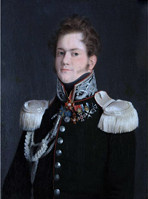
Alexander N. Muravyov, Decembrist, statesman and military leader, was born
10 (21) October, 1792 was born Alexander Muravyov, one of the founders of the Decembrist movement, later - lieutenant general and a prominent statesman of the Russian Empire.
The kin of Muravyovs became known in the 18th century and gave the country a galaxy of prominent public, government, and military leaders. Father of Alexander Nikolaevich was a general, a member of the Napoleonic wars, Nikolai Nikolaevich, whose other sons later became famous too: prominent military leaders and statesmen, Nikolai and Mikhail (who later were awarded honorary prefixes to their names, "Karsky" and "Vilensky", respectively) and the Orthodox religious writer and historian, Andrew.
Alexander received a good education at home, and in 1810 he graduated from the Moscow University. The same year he joined the emperor's retinue as a quartermaster. Soon he was promoted to lieutenant and during six months was on the topographical survey in the Volyn and the Kiev Provinces. An important page in Muravyov’s biography was his participation in the war of 1812 and foreign campaigns of the Russian army. In the Battle of Borodino, he was adjutant to M. B. Barclay de Tolly. For his merits in hostilities Muravyov, promoted in 1813 to captain, was awarded the Order of St. Anne, 4th class and 2nd class, the Order of St. Vladimir, 4th class, and a golden sword with the inscription "For Courage" and a number of foreign awards.
After the end of hostilities Alexander was transferred to the Guards General Staff, and, while holding the post of chief quartermaster of the reserve-cavalry corps, was promoted consistently to captain and colonel. In 1817-1818 he was Chief of Staff of the Guard units while the Guard units stayed in Moscow. But brilliant career of the young colonel Muravyov suddenly interrupted, he was arrested on the order of Alexander I for failure of noncommissioned officers of his detachment during one of the parades, and in October 1818 was dismissed.
The milestone in Muravyov’s biography was his participation in a number of secret societies. In early 1816, he initiated the creation of the "Union of Salvation." The core of the organization, in addition to Alexander, was the guards and army officers - brothers M. I. and S. I. Muravyov-Apostol, S. P.Trubetskoy, N. M. Muravyov, P. I. Pestel, M. S. Lunin, F. N. Glinka, I. D. Yakushkin etc. The charter, drawn up by Pestel, proclaimed the organization's goals: abolition of serfdom and replacement of autocracy by constitutional monarchy. Disagreements over how to implement these goals provoked a heated debate within the society and led to the dissolution of the "Union of Salvation" in the autumn of 1817.
A few months later was organized the "Union of Prosperity", whose charter called "The Green Book" was written by Muravyov. However, in May 1819 Alexander Nikolaevich announced his withdrawal from the "Union of Prosperity" and departed from the activities of secret societies. Muravyov’s nonparticipation in the Decembrist uprising had not help him to escape punishment - in January 1826 he was arrested and imprisoned in the Peter and Paul fortress. In July 1826 Muravyov was convicted by the Supreme Criminal Court by IV category and sentenced to exile in Siberia without loss of rank and nobility.
Constrained financial situation in exile forced him to plead for permission to join the civil service. The petition of Muravyov was satisfied: in April 1828, he was appointed mayor of Irkutsk and did a great job in this post on the improvement of the city. In 1831, Muravyov became chairman of Irkutsk provincial government in the rank of state councilor, and a year later he was transferred to Tobolsk to the same position, but almost immediately was appointed civil governor of Tobolsk. Soon, under the patronage of influential relatives, Alexander was transferred to Vyatka, where he was chairman of the Criminal Chamber, and then - to Simferopol to the similar position. In November 1837 he was appointed civil governor of Arkhangelsk.
In April 1843 Muravyov was attached to the Ministry of Internal Affairs and was charged with inspection of individual provinces; in 1848 he was made State Councillor. However, his position of a civil official did not satisfy Muravyov, and in May 1851 at his own request, he was enrolled for military service in the rank of colonel, and attached to the General Staff. In 1854 he was awarded the rank of Major General and appointed Chief of Staff of the 2nd Infantry Corps. In this capacity, he took part in a series of military operations of the Crimean War. In September 1855, due to failing health Muravyov was dismissed, while still recorded at the General Staff. In September 1856 the new Emperor Alexander II appointed him military governor of Nizhny Novgorod. In this post Muravyov remained until 1861.
The latest chapter in the work of Alexander was his involvement in the preparation of the Emancipation reform. In April 1861 he was promoted to lieutenant-general, and in September of the same year Muravyov was appointed senator.
Alexander Nikolayevich Muravyov died 18 (30) December 1863, at the age of 71 and was buried in the Novodevichy Convent.
Lit.: Герасимова Ю. И. Декабрист А. Н. Муравьев в годы первой революционной ситуации // История СССР. 1979. № 4; Она же. Материалы А. Н. Муравьева в фондах отдела рукописей // Записки Отдела рукописей ГБЛ. 1975. Вып. 36; Задонский Н. Н. Губернатор-каторжник // Тайны времен минувших. Воронеж, 1964; Муравьев А. Н. Сочинения и письма. Иркутск, 1986; Туманик Е. Н. Александр Николаевич Муравьев: начало политической биографии и основание первых декабристских организаций. Новосибирск, 2006; Она же. А. Н. Муравьев в Союзе благоденствия // 14 декабря 1825 года. Источники, исследования, историография, библиография. СПб., 2005. Вып. 7; Она же. А. Н. Муравьев в Союзе Спасения // 14 декабря 1825 года. Источники. Исследования. Историография. Библиография. СПб., 2004. Вып. 6.
Based on the Presidential Library’s materials:

